ESL Legal Vocabulary
When traveling abroad it is important to have a good ESL legal vocabulary. You hope you do not need to use it, but just in case you get into trouble or someone else needs your help, you should make sure you know plenty of vocabulary about the law.
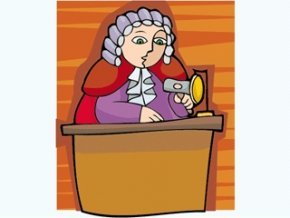
This page will help you do this by giving you a list of vocabulary about the law and legal areas. The vocabulary given on this page will let you know and understand what is happening if someone commits a crime or you need to go to court. All of the items in the vocabulary list have a definition so you know what they mean. Then there are flashcards of the vocabulary for you to download and use when you are offline.
After that the ESL legal vocabulary has been spoken by a native English speaker and recorded so you can listen to the correct pronunciation. The recording is included in two forms: first as a simple recoding that you can listen to and then as a video you can see in which the flashcards are shown while the words are spoken.
Then there are three exercises for you to do to test your knowledge of the ESL legal vocabulary.
- Identify the correct definition of a word.
- Identify the correct meaning of a definition.
- Identify pictures of vocabulary items.
ESL Legal Vocabulary List with Definitions
The following list has the ESL legal vocabulary items. Each word has a definition, and you should try to remember them all. There are also flashcards of all the vocabulary items that you can download and use anytime you are free. After that there is a recording of the ESL legal vocabulary being pronounced by a native English speaker.
Accuse: To claim someone did something, often something illegal. (verb)
Accused: A person that is alleged to have done something. (noun)
Acquit: To say a person is not guilty and did not perform a crime. (verb)
Advocate: A lawyer who argues for a particular side of a case in court. (noun)
Allege: To say that someone might have done something, but it has not been proven to be true. (verb)
Appeal: To try to reverse the judgment of a court. (verb)
Appeal-court: A special court where appeals are heard. (noun)
Arrest: When a police officer takes away someone who has committed a crime. (noun)
Arson: To illegally set fire to something. (noun)
Assault: To physically attack another person. (verb)
Bailiff: A court worker who enforces the judge’s orders. (noun)
Ban: To prevent someone from doing something for a certain amount of time. (noun)
Barrister: A senior lawyer that works in higher or more important courts. (noun)
Bench (1): Where the judge sits in a court. (noun)
Bench (2): A collective name for all the judges within a court. (noun)
Break-the-law: To do something that is not allowed under the law of that country. (verb)
Bribery: To give something (normally money) to get an advantage. (noun)
Burglary: To steal something from within a building or vehicle. (noun)
Capital punishment: The use of the death penalty for some crimes. (noun)
Case: A single item happening within a court. (noun)
Charge: To officially claim that a person broke the law. (verb)
Civil law: The rules related to the running of a country or state. (noun)
Commit a crime: To do something illegal. (verb)
Compensate: To give something (often money) to offset criminal damage. (verb)
Convict: To state that someone is guilty of a crime. (noun)
Court clerk: The person who ensures a court runs smoothly, the person who keeps the court records. (noun)
Courtroom: The place where cases are heard by a judge. (noun)
Criminal law: The rules related to crime and the punishment of crimes. (noun)
Criminal: A person who has been convicted by a court. (noun)
Death penalty: To kill someone as a form of punishment for committing a crime. (noun)
Defence attorney: A lawyer who explains why a person did not do the crime or why they are innocent. (noun)
Defence: The argument as to why someone is innocent. (noun)
Defendant: The person who has been accused of committing a crime. (noun)
Dock: The place where the defendant sits during the trial. (noun)
Drink-driving: The crime of driving a vehicle after drinking alcohol. (noun)
Drug dealing: The crime of selling illegal drugs. (noun)
Embezzlement: The crime of stealing money owned by someone else but which you were in charge of. (noun)
Evidence: The material and information that is used in a court case to show innocence or guilt. (noun)
Expert witness: Someone who knows a lot about a topic and is called to give evidence. (noun)
Felony: A serious crime (American English). (noun)
Fine: To be required to give away money as a punishment for committing a crime. (noun)
Foreperson: The leader of a jury and the person who speaks for them. (noun)
Forgery: The crime of making something and claiming it is something else. (noun)
Fraud: The crime of using false information to get something. (noun)
Guilty: To be found to have committed a crime. (adjective)
High-court: The most important court in a country (British English). (noun)
Hijack: The crime of taking a vehicle with people in it and forcing it to go somewhere. (noun)
Homicide: The crime of intentionally killing someone (same as murder) (American English). (noun)
Illegal: Something that is not allowed by the laws of a country. (adjective)
Imprison: To put someone in prison as a punishment for committing a crime. (verb)
Indict: To officially accuse someone of committing a crime. (verb)
Innocent: To be proven to be not guilty, to have not committed the crime. (adjective)
Judge: The person who decides what sentence to give to someone found guilty of committing a crime. (noun)
Jury: A group of 12 people who listen to the evidence in a case and then decide if the accused is guilty. (noun)
Jury room: The room where the jury goes to consider the evidence and decide a verdict. (noun)
Justice: A situation where a guilty person has been punished. (noun)
Juvenile: A person who is not an adult and is often dealt with in special courts. (noun)
Kidnapping: The crime of taking a person away and demanding money to return them. (noun)
Law: The rule or rules that govern how people should behave. (noun)
Lawsuit: A court case brought by an individual person rather than officials. (noun)
Lawyer: A person who studies and practices law. (noun)
Legal: Related to and governed by the law. (adjective)
Magistrate: A judge with lower qualifications who deals with minor offences. (noun)
Manslaughter: The crime of accidentally killing someone. (noun)
Misdemeanour: A less serious crime (American English). (noun)
Murder: The crime of intentionally killing someone (same as homicide) (British English). (noun)
Negligence: To act without proper care for the consequences. (noun)
Not-guilty: To have not committed a crime. (adjective)
Offence: The specific law that a person has broken. (noun)
Parole: To be released from prison early but with restrictions on the person’s actions. (noun)
Perjury: The crime of lying while promising not to lie. (noun)
Pick-pocketing: The crime of stealing something from a person’s pocket or bag. (noun)
Plaintiff: The person who starts an action in a court. (noun)
Plea: The response to whether a person did or did not commit a crime: guilty or innocent. (noun)
Police officer: A person who catches criminals and stops crimes being committed. (noun)
Precedent: Where previous judgments are used as the base of new laws. (noun)
Prison sentence: The time that a criminal has to spend in prison. (noun)
Prison: A place where criminals are sent and locked up as a punishment for their crimes. (noun)
Probation: A period of time where a criminal's behaviour is looked at closely and if they do anything wrong they can go back to prison. (noun)
Prosecution: The lawyers who are trying to prove a person is guilty. (noun)
Public gallery: The area in a court room where people can sit and watch. (noun)
Robbery: The crime of taking something that does not belong to you. (noun)
Shoplifting: The crime of taking something from a shop without paying. (noun)
Smuggling: The crime of bringing something into a country that is illegal or not paying taxes related to the items. (noun)
Solicitor: A lawyer who can be consulted for advice and who prepares documents. (noun)
Stand trial: To be prosecuted in front of a jury. (noun)
Statement: A formal description of what happened or was observed. (noun)
Stenographer: The person who records every word spoken in a court. (noun)
Sue: To start a legal claim against a person or entity. (verb)
Suspect: A person who is believed to have committed a crime. (noun)
Take the stand: To go to the front of the court room (the stand) and give evidence. (verb)
Terrorism: The crime of using violence against people to achieve a specific goal. (noun)
Testify: To give evidence in a court. (verb)
The accused: The person who is standing trial for committing a crime. (noun)
The stand: The place at the front of the court room where witnesses stand to give evidence. (noun)
Theft: The crime of taking something that is not yours. (noun)
Trespass: The crime of entering an area or building without permission. (noun)
Trial: The process of a jury listening to evidence and then giving a verdict. (noun)
Unanimous: When everyone agrees with the same answer. (adjective)
Vandalism: The crime of damaging property. (noun)
Verdict: The final decision reached by a jury, normally ‘guilty’ or ‘not guilty’. (noun)
Victim: The person who has had a crime committed against them and who has suffered. (noun)
Violate: To not follow rules that are specifically set. (verb)
Witness: A person who has information about a crime. (noun)
Vocabulary Flashcards for Legal Words
The following free flashcards of the ESL legal vocabulary are for you to download and use. You can save a pdf of them by clicking the picture or link.
Spoken Legal Vocabulary
The following are recordings of the ESL legal vocabulary being spoken by a native English speaker so you can hear the correct pronunciation. First there is a simple recording and then a video of the flashcards as well as the pronunciation. Listen as many times as you need to to the spoken ESL legal vocabulary.
ESL Legal Vocabulary Exercises
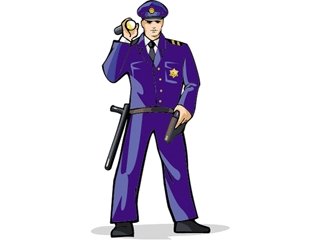
Exercise 1 – Correct Definition
This ESL legal vocabulary exercise has five questions in which you have to identify the correct definition (A-D) for the word given in each question. At the end there is a get score button for you to click to see how well you did.
ESL Legal Vocabulary Definitions
Choose the correct definition for the legal vocabulary in this quiz.
Exercise 2 – Correct Meaning
This time in the ESL legal vocabulary exercise, in each of the five questions you are given the meaning of the word and have to choose the correct option (A-D) that matches it. Again you can see your score by using the get score button.
ESL Legal Vocabulary Identification of Meaning
Choose the word that matches the definition given in each of the five questions in this quiz.
Exercise 3 – Identify Picture
For this ESL legal vocabulary exercise you are given five pictures of vocabulary items and you need to choose the option (A-D) that matches each picture. Click the get score button to see how well you did.
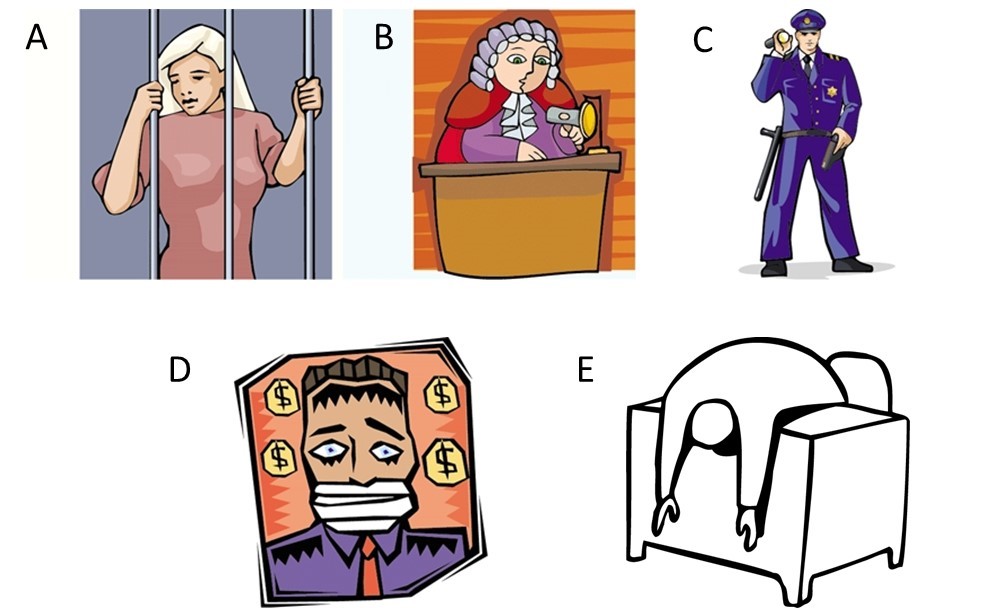
ESL Legal Vocabulary Picture Descriptions
Identify the best description for each of the images (A-E) given above that correspond to the five questions in this quiz.
Other Pages Legal that You Might Like
ESL Legal Conversations
ESL Legal Listening
ESL Legal Reading
ESL Legal Writing
ESL 4u home › Vocabulary › Legal


|
|
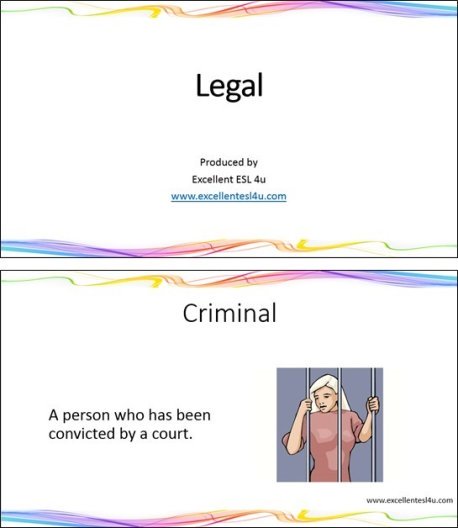

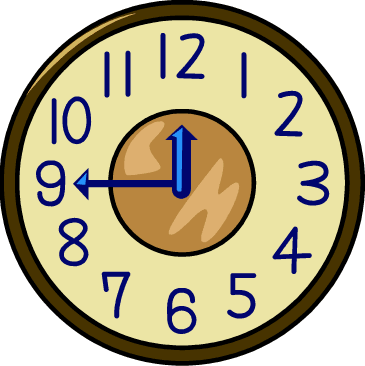

New! Comments
Have your say about what you just read! Leave me a comment in the box below.